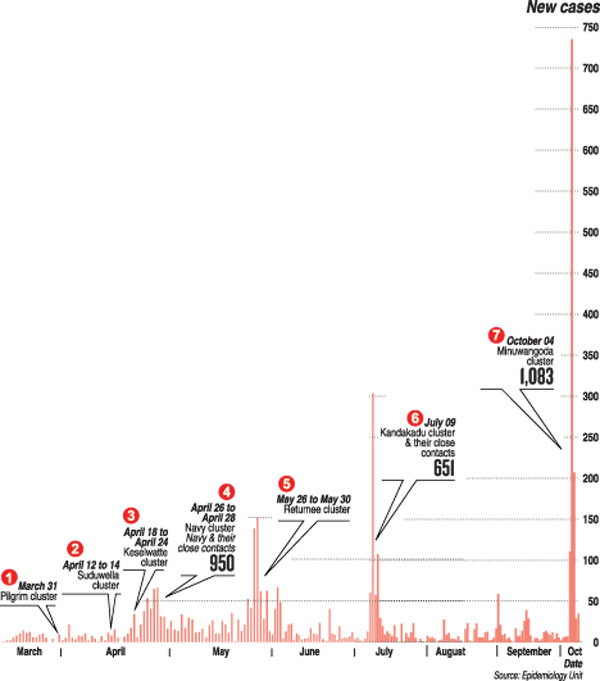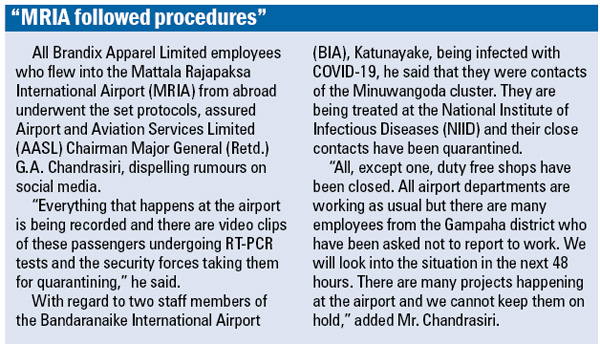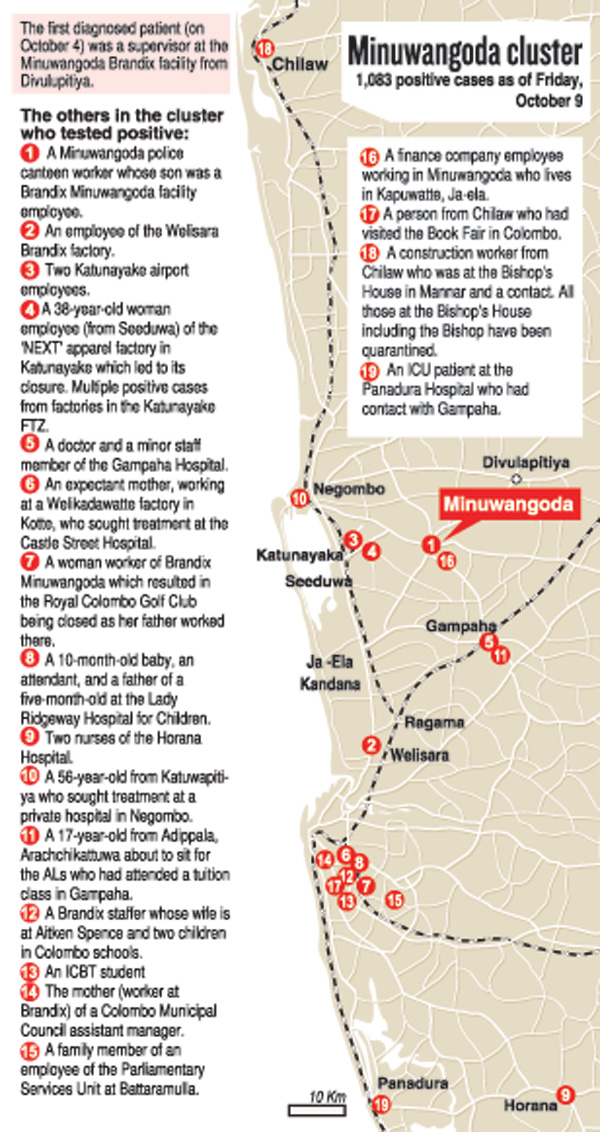News
Act now to rein-in fresh cluster
It is still not too late. Sri Lanka can ‘rein-in’ the current COVID-19 time bomb and mute its fallout if appropriate action is taken right now. 
This was the consensus among many experts including those in the health sector whom the Sunday Times spoke to, who were adamant that “now low-grade community transmission has begun”. They offered valid measures to stem the tide of the latest COVID-19 cluster which mushroomed in Minuwangoda (from October 4), without a source of infection being identified yet. (Please see map)
While commending the health authorities, the Tri-Forces, the State Intelligence Service (SIS) and the police for the efforts put in (implementing preventive health measures, diagnosing positive patients and treating them, quarantining those who have been exposed to the virus, contact tracing et al) since the start of COVID-19 in Sri Lanka, here are their suggestions to stop the spread of the current Minuwangoda cluster:
A short (maybe 10-14 day) lockdown to ‘catch’ all infections and prevent the spread of the virus further.
- The cancellation of all public gatherings including public examinations.
- These sources said the argument of the health authorities that Sri Lanka held a general election safely does not hold sway in the current scenario, as in August the only active clusters were Kandakadu (restricted to those in the Treatment & Rehabilitation Centre, its staff and those who had visited the centre) and the returnees who were in quarantine.
- Ramping up random RT-PCR testing but balancing it to ensure that Sri Lanka has adequate stocks if there is a crisis.
- Decriminalizing and dispelling the stigma surrounding COVID-19 which makes people reluctant to go in for testing as well as quarantining. This will prevent people running away and being sources of infection.
Underscoring that the new coronavirus is an “unseen” enemy, many also reiterated that it is no respecter of persons (from gung-ho American President Donald Trump and British Prime Minister Boris Johnson to top celebrities and humble folk).
“We are not safe until a vaccine is found and we gain access to it,” said a senior health source, a view echoed by many, urging that Sri Lanka should not be under the false and dangerous presumption that the country has “jayagaththa” (won) over COVID-19.
COVID-19 is not a thing of the past. It is very much a ticking bomb of the present and also the future, many kept repeating, while urging that letting down the guard would bring disastrous consequences.
“The Minuwangoda cluster is different to all earlier clusters which were restricted to certain areas. There are no miracles in medicine – but following basic tested scientific thinking,” said a source.
Some experts gave their views on how the Minuwangoda cluster could have erupted:
- The Minuwangoda factory workers could have got exposed to the COVID-19 virus by interacting with a returnee from abroad (either Sri Lankan or foreign) before their 28-day quarantining period was over.
- The Minuwangoda factory workers may have got exposed to those infected in the last cluster in the country – the Kandakadu & Senapura cluster – which is now abating.
- The Minuwangoda factory workers may have got exposed to the virus because it is already in the community.
With the urgency of finding the source of infection of the Minuwangoda cluster, some sources, however, argued that if there was community transmission in Sri Lanka and that was the unseen root of the latest cluster, the manifestation of a community spread would have come earlier. Such a manifestation of the community spread would have sent the elderly who are at high-risk in large numbers to hospitals and been evidenced by high morbidity (disease) and mortality (death) from COVID-19.
| Not a demotion but a reverting to usual seat | |
|
With many eye-brows being raised over the alleged “demotion” of the Head of the Medical Research Institute (MRI), health sources said that Dr. Jayaruwan Bandara was in fact the Acting Director.Dr. P.V.N.P Amarasinghe who has been appointed as Director MRI has the qualification of MD Administration and has returned after his foreign training, the sources said, adding that as such Dr. Bandara reverted to his position of Deputy Director. Speculation was rife this week that Dr. Bandara was demoted for shooting his mouth and reportedly claiming in a television interview that COVID-19 has been in the community in the past few months. Over the past months he has been in the news often, especially in the electronic media, postulating widely on COVID-19. The MRI has been at the forefront of RT-PCR testing in the COVID-19 crisis.
|
| Quarantine curfew & arrests over fake news | |
| The areas currently under a ‘quarantine curfew’ are Divulapitiya, Minuwangoda, Veyangoda, Gampaha, Kirindiwela, Dompe, Pugoda, Ganemulla, Weeragula, Weliweriya, Malwathugiripitiya, Nittambuwa, Mirigama, Pallewala, Yakkala, Ja-Ela, Seeduwa and Kandana.
Deputy Inspector General (DIG) Ajith Rohana explained the three types of curfews that can be clamped in the country:
DIG Rohana said that while under a police curfew and curfew imposed by the President neighbours can visit each other, under the quarantine curfew people cannot mingle at all. If a person violates the quarantine curfew, the police can arrest and charge that person. The penalty is a fine of Rs. 10,000 and up to three months rigorous imprisonment. If an infected person’s property is deemed unsafe, the police can seize and destroy that property. As of Friday afternoon, 92 people have been arrested for violating the quarantine curfew and two for allegedly spreading fake news, it is learnt. A 60-year-old man has been remanded till October 15 for setting a rumour afloat that a COVID-19 patient had escaped from the Colombo South (Kalubowila) Teaching Hospital and an 18-year-old has been remanded till October 22 for spreading talk that an island-wide quarantine curfew would be clamped this week, said DIG Rohana. Meanwhile, the deadline for the employees of Brandix Apparels in Minuwangoda in the Gampaha district to report to the allocated places was Thursday and DIG Rohana said that as far as he knew everyone had done so. A COVID-19 Operations Centre and Control Room have been set up at Police Headquarters to disseminate police instructions to all police divisions and inform the public on COVID-19 related matters. The Control Room hotline is: 1933 and E-mail: igp.cr@police.lk |
| ‘Don’t neglect other diseases but go to hospital’ | |
| While urging people not to neglect any other disease but seek treatment at state hospitals without fear, Chief Epidemiologist Dr. Sudath Samaraweera assured that a circular has been sent on Thursday reinforcing instructions with regard to triaging any suspected COVID-19 patients so that health staff and other patients do not catch the virus. A large exposure is highly unlikely because we are prepared. The circular reiterates the importance of having hand-washing areas, triage areas for suspected COVID-19 patients, a fever corner at the OPD, and a functioning isolation unit and respiratory ward. Triaging for COVID-19 Such triaging will ensure that a large number of hospital staff will not get exposed to the virus leading to a collapse of the system, said Dr. Samaraweera, when asked whether Sri Lanka should have a few health teams ready to be parachuted as troubleshooters in case a large number catch the virus or have to be quarantined. Advice to patients When asked what people should do in case they suspect that they have COVID-19 symptoms, Dr. Samaraweera said that if they are in the Gampaha district, they should go to the nearest state hospital in a private vehicle, strictly following the health precautions of wearing a face-mask, stringent hand hygiene and maintaining a metre-distance. If such people are in areas other than the Gampaha district, but have had contact with Brandix staff or visited Gampaha, then they too should go to a state hospital immediately. He added: “However, if they are in areas other than the Gampaha district and have had no contact with Brandix staff or have not visited the Gampaha area, they should remain calm and not panic as an influx of people to state hospitals could lead to valuable resources being used up unnecessarily. If you have respiratory symptoms, don’t go anywhere, isolate yourself at home and adhere to all the health measures. If there is a worsening of symptoms, seek medical advice.” Plea to take small hospitals for asymptomatic COVID positives Other health sources said that the usual and critical services provided by large state hospitals should not be affected by corona getting precedence. “Otherwise, many people will die of other diseases such as cancer, cardiovascular disease and more. This is why without turning major state hospitals into dedicated COVID-19 hospitals, smaller ones should be designated for that purpose to keep asymptomatic people. The major hospitals could have isolation units where symptomatic COVID-19 patients could be treated,” a source said. Need for separate quarantine facilities for health staff Meanwhile, another aspect that many sources expressed concern was over health staff who may have been exposed to the virus being quarantined at centres accommodating people who are at high-risk of turning positive during their quarantine period. They said that as the health staff is a vital pivot in the battle against COVID-19, they should be accommodated in a separate facility and by now Sri Lanka should have thought of these details and put in place such a plan.
|



